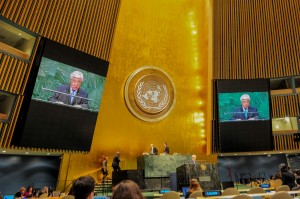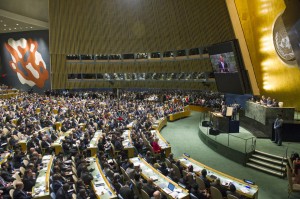NEW YORK – Minister of Foreign Affairs of Kazakhstan Erlan Idrissov addressed the plenary session of the 69th UN General Assembly in New York on Sept. 26 in a speech that warned against rising tensions, double standards and rivalries over “perceived spheres of influence.”
 He called for increased engagement with Central Asia, praised the rise of a new, multipolar world order and promoted Kazakhstan’s candidacy for a non-permament membership of the UN Security Council for 2017-2018.
He called for increased engagement with Central Asia, praised the rise of a new, multipolar world order and promoted Kazakhstan’s candidacy for a non-permament membership of the UN Security Council for 2017-2018.
There is a crisis in the global economy and in the application of international law, Idrissov began, deploring what he called “a lack of vision for our world’s future.” Countries don’t fully recognise their responsibility for their neighbourhoods and the world as a whole as well as themselves, he said.
“Rivalry between the major powers over perceived spheres of influence, markets and control over the production and transit of energy resources has increased. Tensions are on the rise, and the dangerous – and unacceptable – belief in the ‘right of power’ in world politics has strengthened. As a result, we are witnessing a renewed arms race and the use of military force to impose and extend one’s influence,” Idrissov said. Instead of solutions, we are witnessing the escalation of problems, exacerbated by double standards and unilateral actions, he continued. He criticised today’s “confusing media space,” where “it is impossible to distinguish lies from truth.”
Concurrent with global crises, however, Idrissov also identified a developing new order, in which “no country has exceptional rights or advantages.”
“We are seeing a fundamental change in the structure of geopolitical, geo-economic and transnational relations. What is emerging is a polycentric system of international transactions. Within this framework, nobody has the right to determine global and regional processes unilaterally,” he said.
To help adjust to the new order, he called on the UN to use President of Kazakhstan Nursultan Nazarbayev’s G-Global initiative of 2012. “[G-Global] seeks solutions based on five principles – a strong preference for evolutionary rather than revolutionary policy change; the crucial importance of justice, equality and consensus; the promotion of global tolerance and trust; the need for global transparency; and finally, the encouragement of constructive multilateralism.”
Difficult times call for collective decision-making, he said. “Unfortunately, the decisions taken in the wake of the global financial crisis by G20 and G8 have proved to be insufficient because they were not all-inclusive in their elaboration.” Kazakhstan, therefore, encourages UN member states to use G-Global dialogue to help draw up more inclusive plans, he said. “We have already embarked on this process through the Astana Economic Forum, which resulted in a draft Anti-Crisis Plan offered to the UN.” The plan should be given serious consideration, he said.
 Turning to the region, Idrissov said he supported China’s initiative, which is currently chairing the Conference on Interaction and Confidence Building Measures in Asia (CICA), “for a new Asia security concept based on the principles of common, comprehensive, co-operative and sustainable regional security.” CICA, an initiative first proposed by President Nazarbayev in 1992, could itself be transformed into an Organisation for Security and Development in Asia, he said, which would strengthen Asia’s regional security architecture.
Turning to the region, Idrissov said he supported China’s initiative, which is currently chairing the Conference on Interaction and Confidence Building Measures in Asia (CICA), “for a new Asia security concept based on the principles of common, comprehensive, co-operative and sustainable regional security.” CICA, an initiative first proposed by President Nazarbayev in 1992, could itself be transformed into an Organisation for Security and Development in Asia, he said, which would strengthen Asia’s regional security architecture.
The foreign minister noted Kazakhstan’s co-sponsorship of the Security Council Resolution on Foreign Terrorist Fighters, saying Kazakhstan believes in a comprehensive approach to the fight against terrorism. “It is an approach which must be built on greater regional and global cooperation with the active participation of all UN member states in accordance with the United Nations Charter and international law.” He mentioned Kazakhstan’s efforts toward ethnic and religious harmony, including the Congress of Leaders of World and Traditional Religions held every three years in Astana.
Praising the resolution to Afghanistan’s presidential election, Idrissov said that “Economic development will be key to Afghanistan’s re-emergence as a peaceful and prosperous nation and good neighbour in Central Asia.” Kazakhstan supports increased Afghan integration into trade, energy and transportation links, he said.
But regional problems, including border conflicts and water and energy problems, will not be solved without outside engagement, he said. “There is little sign, regrettably, that these problems will disappear in the near future. That is why the UN and the international community must work in Central Asia more purposefully.” He called for the establishment of the United Nations Regional Diplomacy Hub in Almaty, which he said would complement the work of the UN Centre for Preventive Diplomacy in Ashgabat. “The presence of these two regional UN bodies would cover a very broad range of challenges faced by countries in this vast region, including Afghanistan.”
“Most importantly, we believe a stronger UN presence in Almaty would allow the UN to better support Central Asia and wider Eurasia at a critical time in its history, ‘filling in’ the geographical gap between UN offices in Istanbul and Southeast Asia,” he said.
Idrissov also noted Kazakhstan’s efforts toward nuclear nonproliferation, including the Treaty on a Nuclear-Weapon-Free Zone in Central Asia (CANWFZ) or Semipalatinsk Treaty, the protocol of which was signed in May in what he called “a major moment for nuclear security in our region.” He encouraged the U.K., the U.S., France, Russia and China to ratify the protocol as soon as possible.
Idrissov also urged stakeholders to uphold the provisions of the Treaty on the Non-Proliferation of Nuclear Weapons and to work toward the entry into force of the Comprehensive Nuclear-Test-Ban Treaty (CTBT), a goal which is pursued by another of Kazakhstan’s international advocacy campaigns, The ATOM Project. He called on member states to adopt the Universal Declaration on the Achievement of a Nuclear-Weapon-Free World and reiterated Kazakhstan’s commitment to the equal right of nations to nuclear technology and its readiness to host the International Bank of Low-Enriched Uranium under the auspices of the International Atomic Energy Agency.
Regarding climate change and the Climate Change Summit, Idrissov said, “We are eager, as a country, to continue playing our role in tackling the threat of climate change.” The country is working hard on a plan to transition to a green economy, he said, and has recently adopted voluntary commitments to reducing greenhouse gas emissions under the United Nations Framework Convention on Climate Change and begun operating a national system for greenhouse gas emissions trading. Kazakhstan will provide support to 60 developing countries to take part in EXPO 2017, with its theme of ‘Future Energy,’ Idrissov said, and is supporting a number of green initiatives internationally.
Idrissov closed by promoting Kazakhstan’s candidacy for a nonpermanent seat on the UN Security Council for 2017-2018. “Our extensive engagement in international affairs, including chairing key regional organisations … has given us relevant experience to bring to this important role,” he said.
“We support the principle of fair and equitable geographical rotation and adequate representation of all member states of the Asia-Pacific Regional Group on the Security Council. It is clear that the vast Central Asian region will remain strategically and vitally important on the global agenda. We believe the priorities and challenges of this region should be represented in the Security Council and Kazakhstan is ready to play this role.”
Michelle Witte contributed to this report from Astana.
